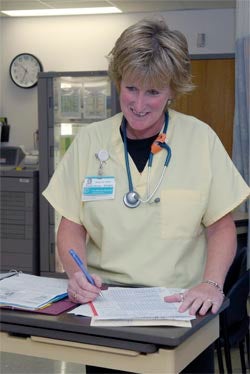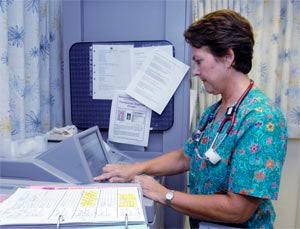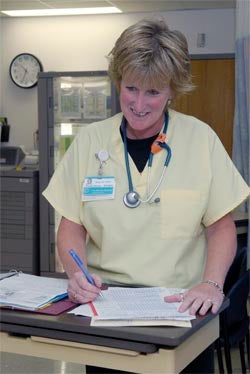 Participants say on-site bachelors’ program enriches nursing workforce
Participants say on-site bachelors’ program enriches nursing workforce
KINGSTON, R.I. — October 10, 2006 — Noreen Strayer has been a nurse for 20 years at The Miriam Hospital in Providence and has always felt that the raw material for nursing excellence comes from within.
But after earning her bachelor’s degree this year through a special hospital-based program offered in conjunction with the University of Rhode Island’s College of Nursing, her perspective has deepened.
“I definitely gained more knowledge and I learned how to conduct research,” said Strayer, who works in the outpatient recovery room.
The program, however, meant even more to Strayer and 41 other nurses at The Miriam who earned their bachelors’ degrees in May. They point to broader perspectives, hospital connections that have improved morale and performance and a sense of pride in being able to complete their studies while working and managing their families.
Now those new URI graduates are serving as mentors to a fresh cohort of 35 nurses pursuing their bachelors’ degrees at Miriam.
“It is a great deal of work, but when you finish, you are so proud,” said Strayer, a Pawtucket native who now lives in Rehoboth, Mass. She earned her associate’s degree and became a registered nurse at the Community College of Rhode Island.
“This joint URI-Miriam program also helped my fellow nurses and me develop a real cohesiveness. There were a few times that I wanted to give up, but you realize you are not alone and you keep going.”
As part of her studies, she conducted research with a colleague that is expected to be published in an article in the professional journal, Critical Nurse, which examined the concept of closed staffing, which eliminates the practice of rotating nurses from one unit to the next. She presented her findings at a national conference.
“The URI faculty members bent over backwards for us,” Strayer said. “They would go to great lengths to help us succeed. In all cases, they treated us as professionals with a great deal to offer them as well. Remember, this was a new experience for them too.”
Paula Viau, associate dean of the University’s College of Nursing, said the College provided the faculty for all nursing courses, coordinated student advising services, and arranged for all of the other required courses in pharmacy, chemistry, languages, communications and history.
“This is a unique model of collaboration with the nursing department at a leading teaching hospital,” Viau said.
She said much of the credit for getting the program launched goes to Rebecca Burke, Miriam’s vice president of Patient Care Services and chief nursing officer, and Dayle Joseph, dean of URI’s College of Nursing. Burke and Joseph are statewide leaders in the effort to address the shortage of nurses. Miriam, the state’s first Magnet Hospital, is a national leader in nursing development. “Rebecca had the vision and the drive to get this approved by the hospital and Dayle enlisted the support of the faculty to ensure its success,” Viau said.
“I was thrilled when Dean Joseph agreed to partner with us”, said Burke. “This program has provided a vehicle to accomplish several goals of the nursing department at The Miriam including our primary mission of providing the best in patient care. In addition to the benefits our patients receive, ongoing education also results in increased job satisfaction, improved retention rates and a more professionally engaged nurse who better understands the complex healthcare environment. It’s so rewarding to hear the nurses talk about their classroom experience and see how they apply their new knowledge to direct patient care.”
The hospital paid the University for the classes and provided space for the courses, while the students paid application and acceptance fees and for their books and supplies.
“As the students’ adviser, I learned a great deal about contemporary practice because they deal with the state-of-the-art technologies,” Viau said. “We believe that baccalaureate nurses can improve the health care delivery system through evidenced based practices, which in turn leads to better patient care.
 New graduate Deborah Bellows is marking her eighth year at The Miriam this month.
New graduate Deborah Bellows is marking her eighth year at The Miriam this month.
“I was a stay-at-home mom and then earned my associate’s degree in nursing from CCRI in the mid-1990s. From my grammar school days, I always wanted to be a nurse,” Bellows said.
The Seekonk native who now lives in Pawtucket said participating in commencement at URI last spring was one of her proudest days, since the University plays such a major role in her family. “I walked with my daughter Meghan, who graduated that day with a degree in chemical engineering.”
Her younger daughter Martha is a sophomore at URI, and her husband John earned his bachelor’s degree from the University’s College of Business Administration.
“We have a brick outside the Ryan Center that reads ‘Bellows Family Since 1977.’”
And now Deborah is a proud alumna. “When I first heard about the on-site program, I said there was no way that I was going back to school. If it hadn’t been offered on the hospital campus, I would not have done it.
“Chemistry was my toughest class, but because my daughter was in chemical engineering, she tutored me,” Bellows said.
“The best part of the program was that it allowed me to meet nurses from other departments and develop close friendships with them,” Bellows said. “I also became more confident and because I conducted research, it opened my eyes to different possibilities. I now see more opportunities for someone with my professional skills. I can now apply for positions in nursing leadership.”
She was also glad that her general education courses were so enriching. “I took a theater class and a women in U.S. history class. I loved the history class because it offered much more than I learned in high school. I also took Spanish for health care professionals, which is becoming more and more important for nurses.”
Captions for images:
1) CHECK UP: Noreen Strayer, a nurse at The Miriam Hospital in Providence checks a patient’s chart. (Top right)
2) MEDICATION CHECK: Deborah Bellows, a nurse at The Miriam Hospital in Providence works at the hospital’s Medstation.
URI News Bureau photos by Michael Salerno Photography.

